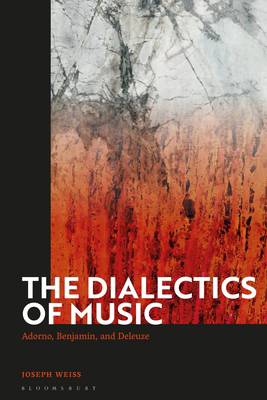
Bedankt voor het vertrouwen het afgelopen jaar! Om jou te bedanken bieden we GRATIS verzending (in België) aan op alles gedurende de hele maand januari.
- Afhalen na 1 uur in een winkel met voorraad
- In januari gratis thuislevering in België
- Ruim aanbod met 7 miljoen producten
Bedankt voor het vertrouwen het afgelopen jaar! Om jou te bedanken bieden we GRATIS verzending (in België) aan op alles gedurende de hele maand januari.
- Afhalen na 1 uur in een winkel met voorraad
- In januari gratis thuislevering in België
- Ruim aanbod met 7 miljoen producten
Zoeken
€ 67,95
+ 135 punten
Omschrijving
Combining the philosophy and musicology of T.W. Adorno, Walter Benjamin, and Gilles Deleuze, alongside an exploration of the dialectical character of music production, Joseph Weiss exposes the unresolved contradictions of contemporary music.
By following the outermost mediations between nature, history, and technology, the book reflects on how advanced music critically responds to the ongoing catastrophe of both the Middle Passage and Auschwitz. Following what the author calls the "categorical imperative" of music, Weiss investigates the significance of a wide range of musical phenomena including the territorialization of the lullaby, the improvisation and sorrow song of the blues and jazz, as well as the cosmological limits of the electroacoustic avant-garde. In the era of commodity production, racialized violence and dispossession, the author defends critical music as a singular index of political possibilities.
By following the outermost mediations between nature, history, and technology, the book reflects on how advanced music critically responds to the ongoing catastrophe of both the Middle Passage and Auschwitz. Following what the author calls the "categorical imperative" of music, Weiss investigates the significance of a wide range of musical phenomena including the territorialization of the lullaby, the improvisation and sorrow song of the blues and jazz, as well as the cosmological limits of the electroacoustic avant-garde. In the era of commodity production, racialized violence and dispossession, the author defends critical music as a singular index of political possibilities.
Specificaties
Betrokkenen
- Auteur(s):
- Uitgeverij:
Inhoud
- Aantal bladzijden:
- 200
- Taal:
- Engels
Eigenschappen
- Productcode (EAN):
- 9781350244078
- Verschijningsdatum:
- 29/12/2022
- Uitvoering:
- Paperback
- Formaat:
- Trade paperback (VS)
- Afmetingen:
- 156 mm x 234 mm
- Gewicht:
- 281 g

Alleen bij Standaard Boekhandel
+ 135 punten op je klantenkaart van Standaard Boekhandel
Beoordelingen
We publiceren alleen reviews die voldoen aan de voorwaarden voor reviews. Bekijk onze voorwaarden voor reviews.









